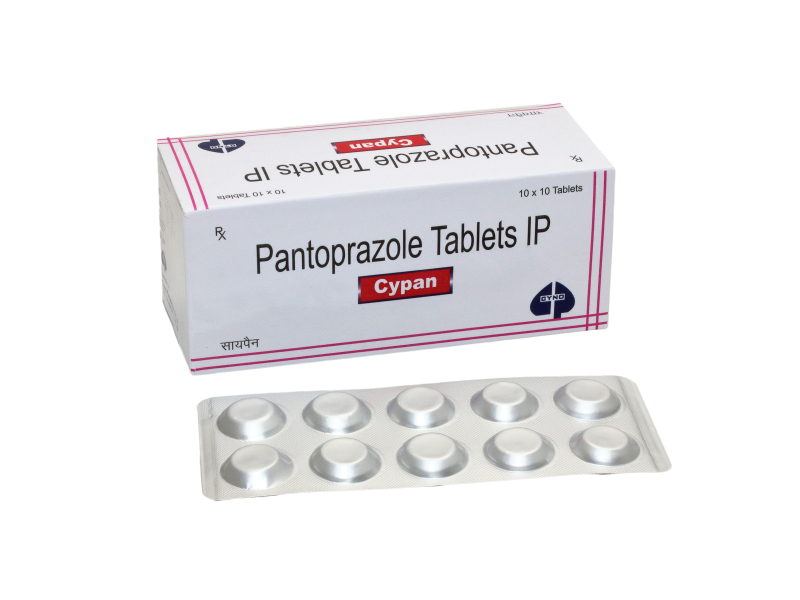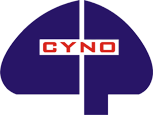CYPAN
Pantoprazole (40 mg)
Cypan 40mg Tablet is a medication that reduces the amount of acid produced in your stomach. It is used to treat stomach and intestine acid-related diseases such as heartburn, acid reflux, peptic ulcer disease, and some other stomach conditions associated with excessive acid production. Cypan 40mg Tablet is also used to prevent stomach ulcers and acidity, which can be seen with prolonged use of painkillers. It belongs to a class of drugs known as proton pump inhibitors (PPIs).

Mechanism of Action
Pantoprazole is a proton pump inhibitor. After administration, it spreads to the parietal cell of the stomach and accumulates in the secretory canal. Pantoprazole is converted to sulfenamide in an acidic medium. This sulfenamide covalently interacts with the sulfhydryl (SH) group in the proton pump (H + K + ATPase) and inhibits the exchange of extracellular K + for intracellular H + ion. Pantoprazole irreversibly inhibits proton pump activity and reduces gastric acid secretion. Pantoprazole is more acid-stable and its activity is lower at higher pH. It is the only proton pump inhibitor available in parenteral form.
Onset Of Action
2-4 hours
Half-Life
60 minutes
Indications
1. Duodenal ulcer 2. Benign Gastric ulcer 3. Zollinger- Ellison syndrome 4. Gastroesophageal reflux disease
Pharmacokinetic Properties:
Absorption: Pantoprazole is well absorbed after oral administration. Its bioavailability is about 77% as it first undergoes metabolism. Distribution: It is widely distributed in the body in protein-bound form. Metabolism: Pantoprazole is extensively metabolized in the liver. Excretion: It is excreted mainly in urine and small amounts in feces.
Drug-Drug interactions:
There are no clinically relevant interactions at therapeutic doses: phenazone (antipyrine), diazepam, digoxin, theophylline, carbamazepine, diclofenac, phenprocoumon, phenytoin, warfarin, nifedipine, caffeine, metoprolol, or ethanol. Oral contraceptives: hormonal contraceptive does not appear to compromise efficacy as no interactions with low-dose combined oral contraceptives have been observed.
Precautions:
1. Hepatic impairment 2. Monitor liver function 3. Avoid prolonged use
Breastfeeding:
There is insufficient information on the excretion of pantoprazole in human milk but emissions have been reported in human milk. The decision about whether to stop breastfeeding the baby or stop breastfeeding / taking into account the benefits of breastfeeding for the baby and the benefits of pantoprazole therapy for the woman.
Fertility:
There was no evidence of impaired fertility
Dosage:
Oral: Adult: 20–40 mg/day before breakfast. Duodenal ulcer: 40 mg/day should be taken 2 – 4 weeks before breakfast. Benign gastric ulcer: 40 mg/day should be taken before breakfast for 1 – 2 months. Zollinger-Ellison syndrome: By increasing the dose to 80 mg/day in 2 divided doses, it can be increased to 240 mg/day if necessary. Gastroesophageal reflux disease: 20 – 40 mg/day should be taken for 1 month before breakfast and if necessary continue treatment for 1 more month. Parenteral: 40 mg as an IV injection once in 15 minutes. Children under 12 years old: Not recommended
Duration of action:
1 day
Adverse Reaction:
1. Diarrhoea 2. Nausea 3. Vomiting 4. Headache 5. Flatulence 6. Abdominal pain 7. Pruritis 8. Dizziness 9. Rash
Storage:
Store at 15 – 30 degrees C in a tightly closed container. Protect from light.
Overdosage:
Give supportive measures and symptomatic treatment.
Contraindications:
Hypersensitivity to Pantoprazole
Warnings:
People taking high, multiple daily doses for more than a year have an increased risk of bone fractures.
Vitamin B-12 deficiency, which can cause severe nerve damage and worsening of brain functions.
Chronic inflammation of the stomach’s lining (atrophic gastritis) when taking pantoprazole for a long term. People with H. pylori are particularly at risk.
Low blood magnesium (hypomagnesemia), has been seen in some people taking pantoprazole for up to three months. More often, it occurs after one year or more of treatment.
Pregnancy
Contraindicated
Breast Feeding
Contraindicated
Old Age
Use with caution
Children
Use with caution Below 12 years: Contraindicated
